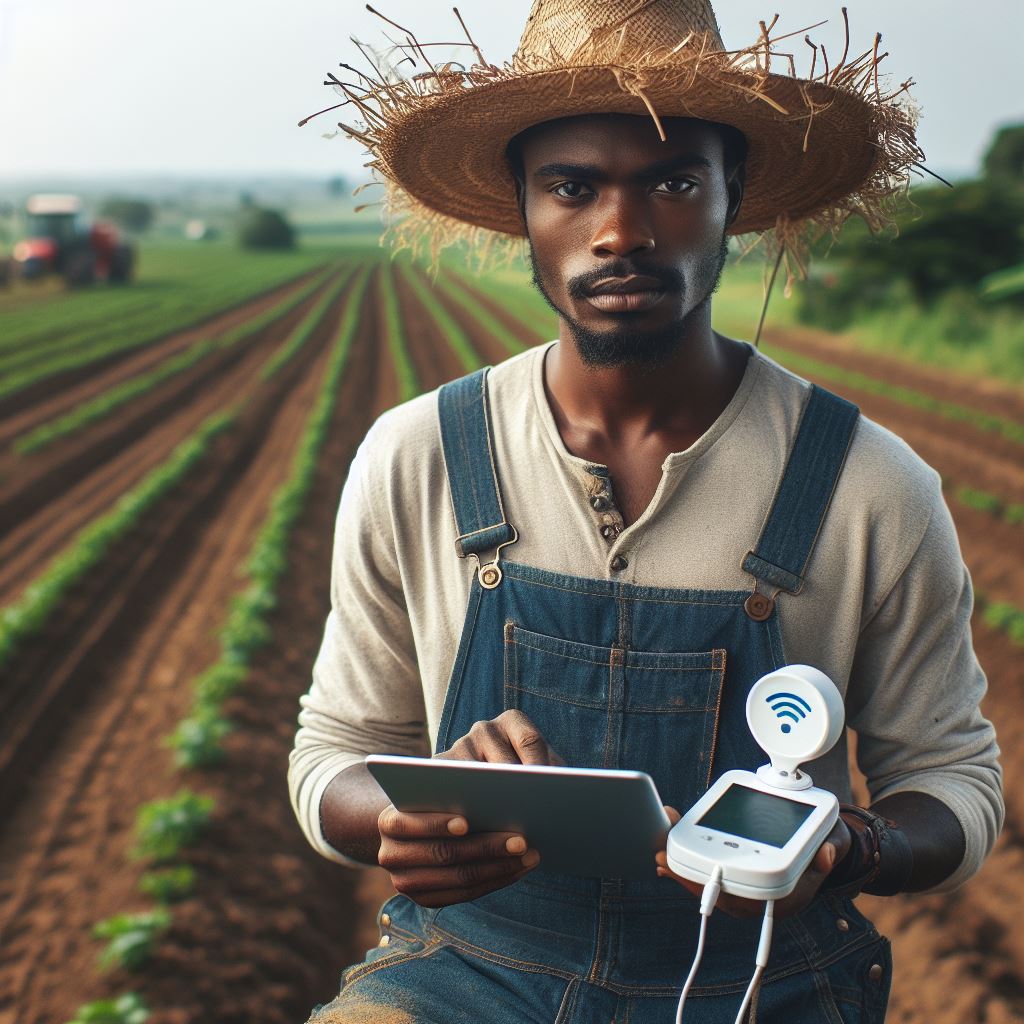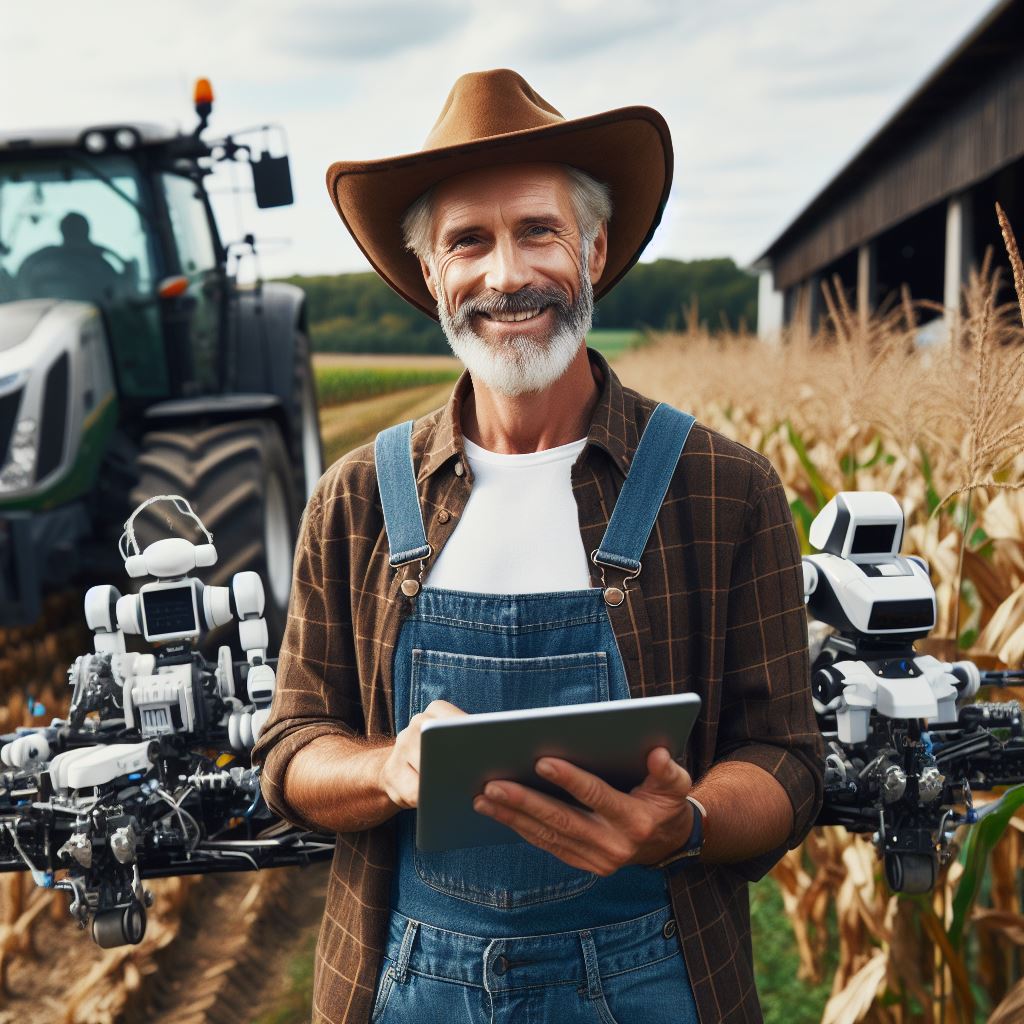Introduction
New age farming embodies a paradigm shift towards innovative, sustainable, and technology-driven agricultural practices.
It integrates cutting-edge technologies like precision farming, drones, and vertical farming to optimize resource use and maximize yields.
With a focus on sustainability, new age farming prioritizes environmental stewardship, biodiversity conservation, and community well-being.
This approach revolutionizes traditional farming methods, ensuring food security, resilience, and prosperity in the face of modern challenges.
This blog post will focus on sharing inspiring stories from young growers in the industry.
Why Young Farmers and Their Stories Matter
A. The importance of showcasing young farmers’ experiences
Young farmers bring fresh perspectives and new energy to the farming industry.
Sharing their stories inspires others to consider a career in agriculture.
Highlighting their experiences brings attention to the challenges and successes of farming.
Their stories can help dispel misconceptions and stereotypes about farming.
Showcasing young farmers’ experiences fosters a sense of community and support within the industry.
It allows for the exchange of ideas and provides a platform for collaboration among farmers.
Young farmers’ stories can serve as a source of inspiration and guidance for aspiring farmers.
By sharing their experiences, young farmers become advocates for sustainable and responsible farming practices.
These stories can also help promote the importance of locally grown and organic produce.
Showcasing young farmers’ experiences can attract more attention and support for the farming industry as a whole.
Transform Your Agribusiness
Unlock your farm's potential with expert advice tailored to your needs. Get actionable steps that drive real results.
Get StartedB. How their innovative ideas contribute to the farming industry
Young farmers often bring innovative and modernized approaches to traditional farming methods.
They embrace technology and incorporate it into their farming practices for improved efficiency.
Their innovative ideas help address the challenges of climate change and resource scarcity.
Young farmers experiment with new crops and farming techniques to diversify the agricultural landscape.
They incorporate sustainable practices such as organic farming and permaculture into their operations.
Young farmers are more open to adopting and implementing environmentally friendly technologies.
Their innovative ideas contribute to the development of sustainable and resilient farming systems.
They explore alternative farming models, such as urban farming or vertical gardening, to maximize limited space.
Young farmers often leverage social media and online platforms to promote their products and connect with consumers.
Their innovative approaches attract younger generations to engage with agriculture and support local food systems.
In essence, showcasing the experiences of young farmers is vital to the farming industry.
Their stories inspire, educate, and foster a sense of community.
Moreover, their innovative ideas contribute to the development of sustainable and modern farming practices.
Young farmers play a crucial role in shaping the future of agriculture, making their voices and experiences matter.
Highlighting Diverse Experiences
A. Interview young farmers from different regions
1. Story of a young urban farmer
I interviewed Alex, a young farmer who grows vegetables and herbs on a rooftop in the middle of the city.
Despite the limited space, Alex has managed to create an oasis of greenery.
He explained how he had to adapt traditional farming techniques to fit the urban environment.
Alex uses vertical farming and hydroponics to maximize his yield and conserve water.
He faces unique challenges such as dealing with limited sunlight and the lack of soil.
However, Alex is passionate about providing fresh, organic produce to urban dwellers and believes in the importance of reconnecting people with their food.
2. Story of a young farmer in a rural community
In a small rural town, I met Sarah, a young farmer who grew up on a family farm.
Sarah shared her experience of taking over the farm after her parents retired.
She explained how she had to balance tradition with innovation.
Sarah faced challenges such as limited access to capital and finding a market for her products. However, she successfully diversified the farm by starting a CSA program and selling directly to local restaurants.
Showcase Your Farming Business
Publish your professional farming services profile on our blog for a one-time fee of $200 and reach a dedicated audience of farmers and agribusiness owners.
Publish Your ProfileDespite the difficulties, Sarah is proud to continue her family’s farming legacy and be a part of the tight-knit rural community.
3. Story of a young farmer specializing in organic farming
I spoke with James, a young farmer who is passionate about organic farming.
He explained the importance of sustainable practices and the harmful effects of conventional agriculture.
James converted his family’s conventional farm into an organic operation.
He faced challenges such as transitioning the land to certified organic and finding markets willing to pay a premium for organic products.
However, James believes in the value of organic farming for both the environment and human health.
He is proud to provide healthy, chemical-free food to his community.
B. The unique challenges they face and how they overcome them
Alex, the young urban farmer, faces space limitations and lack of sunlight. So, he utilizes vertical farming and hydroponics to maximize yield and conserve water.
Sarah, the young farmer in a rural community, struggles with limited access to capital and finding a market for her products.
However, she starts a CSA program and sells directly to local restaurants.
James, the young farmer specializing in organic farming, encounters challenges in transitioning the land to certified organic and finding premium markets.
Nevertheless, he believes in the value of organic farming for the environment and human health.
These interviews highlight the diverse experiences of young farmers and shed light on their unique challenges and solutions.
Whether it’s farming in the heart of the city, carrying on a family legacy in a rural community, or advocating for organic practices, these young growers are shaping the future of agriculture.
Read: Organic Farming Triumphs in Texas: A Story
Success Stories and Achievements
A. Success stories of young farmers breaking barriers
Young farmers around the world have been defying odds and breaking barriers in the agricultural industry.
These success stories not only inspire other aspiring farmers but also highlight the potential and resilience of the new generation in farming.
One such success story is that of Jessica, a 25-year-old farmer from a small town.
Despite facing financial constraints, she took the bold step of starting her own organic farm.
With determination and hard work, Jessica was able to establish her farm and successfully grow a variety of organic crops.
In another inspiring story, John, a 30-year-old farmer, overcame the challenges of limited land availability by implementing vertical farming techniques.
By utilizing vertical space and adopting hydroponics, he managed to maximize his crop production and achieve higher yields compared to traditional farming methods.
These success stories demonstrate how young farmers are not only finding innovative solutions to overcome obstacles but also contributing to sustainable farming practices.
B. Innovative practices and technologies adopted by young farmers
The success of young farmers can be attributed to the adoption of innovative practices and technologies that significantly enhance their efficiency and productivity.
1. Precision agriculture
Many young farmers are leveraging precision agriculture techniques such as GPS-based mapping, sensors, and drones to optimize resource allocation.
These technologies enable farmers to precisely monitor soil conditions, irrigation needs, and crop health, resulting in better yield and reduced environmental impact.
2. Hydroponics
Young farmers are increasingly adopting hydroponic systems that allow for soil-less cultivation.
By providing optimal water and nutrient supply directly to the plant roots, hydroponics eliminates the need for soil, reduces water consumption, and offers controlled environments for year-round production.
3. Vertical farming
To overcome land constraints, young farmers are turning to vertical farming, where crops are grown in stacked layers.
This enables them to utilize limited space more efficiently and achieve higher yields.
Additionally, vertical farming reduces the need for pesticides, herbicides, and other chemicals, making it environmentally sustainable.
4. Aquaponics
Some young farmers have embraced aquaponics, a symbiotic system that combines aquaculture and hydroponics.
In this system, fish waste provides nutrients to the plants, while the plants filter and purify the water for the fish.
This closed-loop system maximizes resource utilization and reduces waste.
5. Agrotech applications
Young farmers are leveraging various agrotech applications, including mobile apps and software, to monitor and manage their farms effectively.
These applications provide real-time data on weather conditions, crop growth, pest infestations, and market trends, allowing farmers to make informed decisions and optimize their operations.
By adopting these innovative practices and technologies, young farmers are not only increasing their chances of success but also contributing to sustainable agriculture and food production.
In general, the success stories and achievements of young farmers breaking barriers highlight their determination and ability to overcome challenges in the agricultural industry.
Their adoption of innovative practices and technologies demonstrates their commitment to sustainable and efficient farming methods.
These stories serve as inspiration for aspiring farmers and pave the way for a new age of farming.
Showcase Your Farming Business
Publish your professional farming services profile on our blog for a one-time fee of $200 and reach a dedicated audience of farmers and agribusiness owners.
Publish Your ProfileRead: Alaskan Farmers’ Quest for Eco Balance

Overcoming Obstacles
Young farmers face numerous challenges on their journey towards establishing successful farms.
Limited access to land and equipment, financial challenges, and a lack of experience and mentorship are some of the common obstacles they encounter.
A. Common obstacles faced by young farmers
- Limited access to land and equipment
- Financial challenges and finding funding opportunities
- Lack of experience and mentorship
The first major obstacle young farmers often struggle with is limited access to land and equipment.
As agricultural land becomes scarce and expensive, it becomes increasingly challenging for young farmers to acquire adequate space to cultivate their crops and raise livestock.
Additionally, the high costs associated with purchasing or leasing farming equipment further hinder their ability to start or expand their operations.
Financial challenges are another significant obstacle faced by young farmers.
Starting a farm requires substantial upfront investments in land, equipment, seeds, and livestock.
Many young farmers find it challenging to secure the necessary funding to get their operations off the ground.
Traditional financing options may not always be accessible or suitable for their specific needs.
B. How young farmers overcome these obstacles through determination and creativity
However, despite these obstacles, young farmers exhibit remarkable determination and creativity in overcoming them.
Instead of being deterred by limited land access, some young farmers have resorted to innovative farming methods such as vertical farming and hydroponics.
By utilizing limited space efficiently, they are able to grow large quantities of crops and reduce dependence on vast expanses of land.
In terms of financial challenges, young farmers have been proactive in finding funding opportunities.
They often explore alternative financing options like crowdfunding, seeking grants or loans from agricultural organizations or government schemes.
Some have even formed cooperative arrangements with fellow farmers to collectively invest in shared resources, reducing individual financial burdens and fostering a sense of community and collaboration.
Lack of experience and mentorship is another significant obstacle faced by young farmers.
Many are entering the farming industry with little to no prior experience, which can make it daunting to navigate the complexities of agricultural practices.
Nonetheless, young farmers have turned to mentorship programs and networking opportunities to learn from experienced farmers and gain practical insights.
Mentors provide guidance, share knowledge, and offer valuable advice, enabling younger farmers to develop the necessary skills and confidence for success.
In summary, young farmers encounter various obstacles, including limited access to land and equipment, financial challenges, and a lack of experience and mentorship.
However, through determination and creativity, they find innovative solutions to these challenges, such as implementing alternative farming methods, seeking alternative financing options, and seeking mentorship.
These young growers exemplify the resilience and resourcefulness required to thrive in the modern agricultural landscape.
Read: Florida Citrus Grower Goes Green: A Tale
The Role of Technology in Modern Farming
A. Leveraging Technology for Sustainable Agriculture
Young farmers are embracing technology to ensure sustainable agricultural practices.
They utilize advanced tools to optimize productivity and reduce environmental impact.
Precision agriculture is a prime example of technology adoption among young growers.
Using drones, they gather real-time data on crop health, irrigation needs, and pest management.
This data-driven approach enables them to make informed decisions and minimize resource wastage.
Additionally, young farmers employ smart irrigation systems that adjust water usage based on weather conditions.
By using soil moisture sensors and weather forecasts, they enhance water efficiency and minimize water runoff.
Young growers also implement vertical farming, a revolutionary technique powered by advanced technology.
Vertical farms utilize controlled environment agriculture to grow crops in vertically stacked layers.
LED lights and hydroponics create the ideal conditions for year-round production in limited spaces.
B. Technological Advancements Adopted by Young Growers
Young farmers have embraced automated machinery to streamline farming processes.
Tractors equipped with GPS technology allow for precise field navigation and operation.
This results in efficient seed planting, fertilization, and pesticide application, reducing costs and optimizing yields.
Robotic systems have also made their way into modern farming, enabling autonomous tasks such as harvesting.
These robots meticulously pick fruits and vegetables without causing any damage or yield loss.
Another technological advancement is the use of smart sensors and Internet of Things (IoT) devices.
Showcase Your Farming Business
Publish your professional farming services profile on our blog for a one-time fee of $200 and reach a dedicated audience of farmers and agribusiness owners.
Publish Your ProfileSensors monitor soil conditions, humidity levels, and temperature, providing farmers with real-time insights
IoT devices connect these sensors and transmit data, enabling farmers to remotely monitor their crops.
Young growers are also leveraging blockchain technology to enhance transparency in the agricultural supply chain.
By recording every transaction, blockchain ensures traceability and eliminates fraud in farm-to-market operations.
Overall, technology plays a pivotal role in modern farming, and young growers are at the forefront of leveraging its benefits.
Through precision agriculture, smart irrigation, vertical farming, and automated machinery, they achieve sustainable practices while maximizing productivity.
Technological advancements such as drones, robots, smart sensors, and blockchain further enhance their efficiency and facilitate transparency in the agricultural sector.
With the continuous integration of technology in farming practices, young growers are driving the industry towards a more sustainable and technologically advanced future.
Read: Next-Gen Farmers: Shaping Agriculture’s Future
The Future of New Age Farming
A. Potential and Impact of Young Farmers
- Young farmers bring innovation, creativity, and fresh perspectives to the future of agriculture.
- They are adopting new technologies and sustainable practices for increased productivity and efficiency.
- Young growers introduce organic farming, urban farming, and hydroponics in response to growing consumer demands for healthier and locally-sourced food.
- They are crucial in addressing the challenges of climate change and ensuring food security for future generations.
- Young farmers contribute to the revitalization of rural communities by creating opportunities for employment and economic growth.
B. Need for Support and Resources
- Young growers require financial support to overcome the high costs of land, equipment, and initial setup.
- Access to affordable credit and loans tailored to their specific needs is essential for their success.
- Training programs, workshops, and mentorship are crucial for young farmers to acquire the necessary skills and knowledge.
- Government policies and incentives should be implemented to encourage and support young growers in their agricultural endeavors.
- Establishing networks and partnerships with experienced farmers and industry professionals can provide guidance and mentorship.
The future of new age farming rests in the hands of young growers who bring innovation, sustainability, and a passion for change.
Their potential and impact on agriculture cannot be underestimated.
However, in order to foster their growth and success, it is imperative to provide them with the necessary support and resources.
Financial assistance, training programs, and government policies are essential to empower and encourage young farmers.
By investing in their future, we secure the future of agriculture, ensuring a sustainable and prosperous food system for generations to come.
Uncover the Details: From City to Farm: A Newcomer’s Story
Conclusion
A. Summary of the significance of sharing stories from young farmers
Sharing stories from young farmers highlights the importance of their experiences in the new age of farming.
B. Encouragement for readers to follow and support the work of these young growers
By following and supporting the work of these young growers, readers can contribute to the growth and sustainability of agriculture.
Let’s rally behind the inspiring work of young growers!
By supporting their endeavors, we champion innovation, sustainability, and the future of agriculture.
Whether through purchasing their produce, sharing their stories, or offering mentorship, let’s nurture their passion and dedication.
Together, we can cultivate a thriving agricultural community that sustains our planet and nourishes generations to come.




